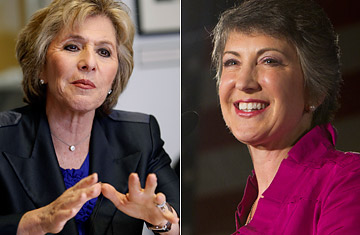
Senator Barbara Boxer, left, and her challenger, Republican Carly Fiorina
If Republicans want to take back the Senate, they will have to defeat embattled Democratic veterans — and in California that would be three-time incumbent Barbara Boxer. To challenge one of the most liberal of Senators, the GOP has the high-octane former Hewlett-Packard CEO Carly Fiorina. Both candidates abhor the mushy political center. But victory, as is often the case, depends on independent voters. If Fiorina is to claim one of the nation's bluest states, she must win over independents, who have more or less supported Boxer in the past. That may just be happening. A new Rasmussen poll shows the race is a dead heat (Boxer 45% to Fiorina 44%) among likely voters. In early August, Boxer led by 5 points. Independents make up a quarter of the electorate; now, they will have to choose between two ideologues. Boxer campaign manager Rose Kapolczynski says voters have a clear choice, "These are two articulate, passionate women who agree on almost nothing."
Fiorina has the advantage of an anti-incumbency mood that has been enhanced by the Golden State's alarming 12.3% unemployment rate. At the recent state GOP convention in San Diego, Fiorina offered a slashing indictment of Boxer, blaming the Democrats for the economic disaster. "In our beautiful state, there is a steady, grinding injustice where the failed policies of Washington's ruling class have smothered hopes in the lives of hundreds of thousands of people — losing jobs, losing homes, destroying businesses."
That has been the Fiorina camp's main mantra. Marty Wilson, Fiorina's campaign manager, insists the election will be decided on the economy, pure and simple. Kapolczynski, however, sees the race as a choice between Boxer and Fiorina. "In the end, the election is not a referendum on the economy but a choice between two people. When voters learn the clear differences between Boxer and Fiorina on jobs, choice and the environment, they'll choose Boxer." The candidates will meet in their only scheduled television debate Wednesday night.
Boxer has her own line on the economy, touting what she's done for it — including funneling federal funds to California's growing clean-energy sector and championing Los Angeles' bid for transit construction. But she also highlights her rival's sharp conservative positions on abortion, offshore drilling, immigration and climate change. "You have to go back the 1960s to find a California Senate candidate who ran on an anti-choice platform and was for opening up California to offshore drilling," says Kapolczynski. "Fiorina is out of step on those two issues."
Boxer has another opening against Fiorina on immigration. The harsh new anti-immigration law in Arizona splits California's voters with 49% favoring and 45% opposing, but is overwhelmingly opposed by Latinos — a key swing group. While gubernatorial candidate Meg Whitman has recently moderated her tough stance on illegal immigration in a bid to woo Latino votes, Fiorina stands firm.
Fiorina keeps her main message focused on job creation and economic growth. "We need a U.S. Senator who will fight for our nation's job creators and champion policies that make it easier — not harder — for them to grow, succeed and hire our fellow Americans." But if the stagnant job market hangs like a noose around Boxer's neck, Fiorina's mixed record leading HP tarnishes her economic message. Fired after the questionable merger with Compaq, a 50% plunge in HP's stock price and disputes with the board of directors, Fiorina can hardly brag about job creation as CEO. She laid off more than 25,000 workers and outsourced thousands of jobs overseas.
Fiorina's candidacy reveals the classic GOP conundrum in California. Moderates rarely win the nomination; but conservatives get tagged as extremists in the general election. In the GOP primary, Fiorina castigated her opponent, former House member Tom Campbell, as a RINO (Republican in name only), releasing a bizarre but effective campaign ad portraying Campbell as a demon sheep — a liberal wolf among the conservative flock. But Fiorina's camp doesn't believe her strong conservative positions on social issues and climate change will keep her from winning. "For a Republican to win in California, you have to win a majority of independents," says campaign manager Wilson. "They make up roughly 25% of the electorate and include decline-to-state voters and Democrats and Republicans who split their ticket." Wilson says these voters — just like the population at large — are very attentive to pocketbook issues. "We don't need to change our message to attract the independents. They have the same concerns about the softening economy and the lack of jobs."
Boxer has survived tough races before. In Fiorina, she is blessed once again with an opponent who is pro-life in a state that is decidedly pro-choice. The BP oil disaster in the Gulf of Mexico also plays in Boxer's favor. A wide majority of California voters oppose offshore drilling (59% to 36% three months after the massive Gulf spill). Speaking in Laguna Beach, Calif., in July, Boxer said, "Every book about California begins by describing our beautiful coast. We're not going to have 'Drill, baby, drill' off the coast." Knowing that the BP disaster has linked the environment and jobs in voters' minds, Boxer points out that 400,000 California jobs are directly related to the coast.
Pomona College political scientist David Menefee-Libey is looking forward to Wednesday's debate. "Both are very articulate speakers, both are comfortable in front of an audience and neither backs down from conflict," he says. "The paradox is that neither has much experience in a high-stakes face-to-face election debate." Jack Pitney of Claremont McKenna College agrees. Fiorina debated her GOP rivals twice, once by phone; and Boxer largely avoided debates with her opponents in prior elections. Considering how combative they are, Pitney says, "The danger for both of them is they really haven't had a lot of time in the ring."
